- Home
- John Bellairs
Drum, the Doll, and the Zombie Page 2
Drum, the Doll, and the Zombie Read online
Page 2
As September ended and October began, Johnny found himself occupied with homework and the World Series and plans for a Halloween party. He soon forgot about the drum and Dr. Coote's odd yarn. Of all Johnny's new concerns, the most pressing was the Halloween party. Two years earlier Johnny had decided that he was too old to go trick-or-treating, so he had remained home and handed out candy to the little kids. Still, Johnny had to admit that he missed the fun of dressing up in some outlandish costume.
That was why he volunteered to help when the teachers at St. Michael's School decided to throw a Halloween party to raise money for some badly needed equipment. The older students would dress up in costumes and run the games that the younger kids would enjoy. To Johnny the party was an ideal opportunity: He could have all the fun of wearing a Halloween costume and none of the embarrassment of having crabby grown-ups peer out at him and mutter, "A little old for trick-or-treating, ain'tcha, kiddo?"
He was trying to decide what kind of costume to wear. He sort of saw himself as a scary vampire, with a long black cloak, slicked-back hair, and fangs. However, he had two big disadvantages. First, his hair was blond, and all the vampires he had seen in the movies had black hair. Second, he wore glasses, and something told him that a bespectacled Count Dracula wouldn't scare even a first grader. He practiced going around the house without his glasses, and he could see clearly enough to avoid bumping into the furniture. Unfortunately, he was nearsighted, and that meant that he might have a hard time judging the winners in the dart toss contest he and two other students would be running. Johnny could imagine what might happen if some first-grader threw a wild dart and he could not see it in time to jump out of the way.
His grandmother suggested that he go as a clown, but Johnny wanted a better idea than that. Grampa Dixon thought they could make him up as a tramp, which was what he always recommended. After all, a tramp costume could be scrounged up from just any old clothes that lay around the house, and it wouldn't cost a cent. It wasn't that Johnny's grandfather was stingy, but he was reluctant to spend scarce money on an outfit that, after all, Johnny could use only one night a year.
Johnny and Fergie went to different schools, but when Fergie found out about the Halloween party, he said he wanted to come along. And he intended to come in costume. "Why don't we both go as zombies?" he asked. "You know, the walking dead, like Dr. Coote was talking about. Beware the walking dead, John baby. I can see it now: We come in wearing moldy clothes, like we've been buried for weeks. We'll get some green makeup for our faces and rub dirt in our hair. Best of all, my dad's got a fishing outfit with these artificial rubber worms in it. He won't mind if I swipe a few. They look real, and we could plaster 'em down on our faces and have them dripping out our noses an' ears! Whatcha think of that, big John? Scary?"
"More disgusting than scary," said Johnny, making a face. "I don't know about putting rubber worms up my nose, but maybe the zombie idea could work. At least it would take the same kind of old clothes as Grampa's tramp costume."
"Sure," said Fergie. "And let's read up on zombies to see if we're missing anything that will make the costumes even sharper. I'll bet the prof has a book or two in his library that would help. How about payin' him a visit and seeing if he'll loan you a coupla volumes?"
"Okay," agreed Johnny. "And if the zombie plan doesn't work, maybe we can find something else just as good."
And that was why, one Wednesday night toward the end of October, Johnny went across the street to Professor Childermass' house after supper. The professor had not had a great deal of time to spend with Johnny lately. A flu epidemic had hit Haggstrum College and Professor Childermass had taken over classes for another history teacher, Dr. Duquesne, who was very sick. Teaching a double load kept the professor extremely busy and it made his temper even worse than normal. Fortunately, he seemed immune to the disease. His students told each other that the flu germs were afraid to attack the crabby old man.
Johnny rang the doorbell twice before he heard shuffling footsteps. The door opened, spilling a warm splash of light out into the night. Professor Childermass appeared troubled and subdued. "Oh, it's you, John Michael," he said. "Come on in. I hope you haven't come bearing ill tidings."
"Uh, no, Professor. I'm not bearing any tidings at all." Johnny stepped into the professor's house. "Why? Have you had bad news?"
Professor Childermass took a deep breath. "Well, yes, I am afraid so. Charley Coote is in the hospital up in New Hampshire."
"Does he have the flu?" Johnny asked.
The professor shook his head. His expression was grim. "No, it's something worse than that. He—well, he's not exactly in his right mind."
They sat at the professor's kitchen table. The kitchen was in its normal messy state, with dirty pots, pans, and dishes stacked in the sink, though it smelled wonderfully of fresh cake and chocolate—baking was just about the professor's favorite hobby. He served up a slice of yellow cake with chocolate-banana icing and poured Johnny a tall glass of milk. Johnny dug in and told the professor how good it was. His friend nodded absently. "What's the matter with Dr. Coote?" asked Johnny.
The professor sat at the table and drank a cup of coffee. "It's rather odd. A doctor on the staff of Mercy Hospital called me. He says that Charley did not show up for his classes on Monday. So around noon someone at the college drove over to his house to check on him. He found poor Charley ill in bed, babbling nonsense. They bundled him off to the hospital, where he kept mentioning my name and phone number over and over again. Except for that he has been making no sense at all, they say. He jabbers about dead people and midnight and that confounded drum, but no one can understand what he is trying to say."
"But what's wrong with him? Don't the doctors know?" asked Johnny. Dr. Coote was not one of his closest friends, but he liked the old man, and the news of his illness upset Johnny.
"The doctors don't know, as a matter of fact," muttered the professor. "Bunch of quacks! It sounds as if my old friend is showing all the mental symptoms of a stroke, but the doctor told me there is no sign of paralysis or any of the other physical symptoms of stroke. They are calling it a 'nervous breakdown' for the time being. I don't know—poor Charley has always been high-strung, and I guess it's possible that he worried himself into a crack-up over that idiotic toy drum."
"What are you going to do, Professor?"
Professor Childermass drank the last of his coffee. "I hardly know," he admitted. "I honestly don't see anything much that I can do. But Charley is an old and dear friend, and I do not have many of them left. I hate to think of him all alone in that hospital. His wife has been dead for years, you know, and they had no children. His only close relative is his sister, and she lives in California or some such barbaric state. So I am the only one who can rally 'round in an emergency. I would go up tonight, but the doctor told me that although Charley is just about helpless, he is in no immediate danger. I'll drive up to see him this Friday after class and stay until Sunday. If nothing else, at least I can show Charley that I am thinking of him, and possibly he will be a bit more lucid with me around than he has been with all those strangers."
Johnny felt embarrassed. All at once his problem of what to wear to a stupid Halloween party seemed unimportant. He said, "Professor, can I—I mean, may I go with you? I like Dr. Coote too, and I'd like to keep you company, if you don't mind my tagging along."
Professor Childermass smiled. He liked very few people the way he liked Johnny Dixon. Johnny was brainy and resourceful and kindhearted—just as he himself had been at that age. And Johnny had a way of making sensible conversation and asking the right questions at the right time, which were gifts that the professor always admired. He said, "If you really want to go, John Michael, I shall be happy to have you along. Fortunately, that blasted young fool Duquesne has recovered from the vapors and brain fever, and he will be taking his worthless students off my hands tomorrow." Professor Childermass hesitated. Then he said, in a very serious voice, "It would be unfair of
me to allow you to go along without saying this, John. Be prepared for the worst."
Johnny felt his heart thump. "What do you mean?"
The professor shook his head and sighed. "I mean that Charley is a tougher old bird than you would think, but he is an old bird. He—well, John, to be honest, he may not make it." For a second the professor just sat at the table looking bleak. Then he began to cry. Johnny swallowed hard at a lump in his throat. For the first time, he realized just how sick Dr. Coote must really be.
CHAPTER THREE
Johnny easily talked his grandparents into letting him go to New Hampshire with the professor. "My stars, Johnny, of course you can go," Gramma said, her wrinkled face showing her sympathy. "I dunno what life would be like if folks didn't stick by their friends. An' who knows, maybe a visit might do Dr. Coote a world o' good. He always seemed t' like you."
So it was all arranged. On Friday as soon as he got out of school, Johnny climbed into the professor's maroon Pontiac, and they set off for Portsmouth, New Hampshire, where Dr. Coote was hospitalized. They drove steadily north, the professor talking the whole way. He had been on the phone to Dr. Coote's doctors, and although the news was not good, at least the old man was holding his own. Even that slender ray of hope put the professor into a slightly more optimistic frame of mind as the car careened along. Johnny frequently had to fight to keep from crying out in alarm as the Pontiac wove in and out of traffic. Professor Childermass was a miserable driver, and on five or six occasions he came close to sides wiping another car or running off the road. He never seemed to notice these hairbreadth escapes himself, and he chatted away nonchalantly the whole time.
As usual, the professor refused to stop and ask for directions, insisting that he was old enough to find his way around a dinky little New Hampshire town. They came to the outskirts of Portsmouth, and the professor took a few turns that he thought were familiar. He quickly got lost. The Pontiac roamed streets of boxy white frame and gray clapboard buildings, passed the tall, narrow mansions of Strawberry Banke, and wandered near the Piscataqua River. They drove aimlessly around Portsmouth for almost an hour before Professor Childermass threw in the towel. With a furious expression he pulled into a service station and stopped the car with a screech of brakes. At once a skinny young man in a gray baseball cap and grease-stained gray coveralls trotted out and stooped by the driver's window. "Can I fill 'er up for ya?" he asked, smiling cheerfully.
"You may not," said the professor coldly. "I suspect that this particular brand of gasoline is filthy with pollutants and automotive poisons. If I allowed you to put so much as one teaspoonful in my car, the engine would no doubt scream in agony, give a feeble kick, and expire altogether. Moreover, I despise your company's inane commercial jingle and deplore the tasteless so-called comedian it sponsors on television. However, since you are so eager to help, you might as well tell me where in this dreary burg I could find a sinkhole of suffering misnamed Mercy Hospital!"
The young man's eyes grew round and his mouth hung open. He gulped a couple of times. "Sure," he said. He pointed with a shaking finger. "'S easy. Just turn right at the corner ahead, then go straight until ya come t' the first stoplight. Turn left at the light an' go about a quarter of a mile. The hospital will be the big brick building off to your right."
"Don't you dare tell me I can't miss it!" thundered the professor.
"Uh, s-sure, y' can m-miss it if y' want to," stammered the young man. He stood wiping his face with an oily pink rag as the professor floored the accelerator and the Pontiac roared out of the service-station lot. Despite his worries about Dr. Coote's condition, Johnny got a case of the giggles. It was always interesting to witness someone's first introduction to the professor.
Without any more trouble they found the hospital, a red-brick relic of the 1890s, three stories tall with a green tile roof. The windows all had arched tops, and round fanlights crowned all the doors. In the deepening dusk many of the windows glowed with soft yellow light. The professor parked the Pontiac, and they hurried toward the old building. By now the sun had vanished behind a bank of ragged gray clouds, and a chilly wind had sprung up, rattling the few dead leaves left on the oaks and maples that bordered the parking lot.
"Uh-oh," Johnny said as they went in. "We're about five minutes too late, Professor." He pointed to a black-bordered sign posted on the wall just inside the entrance:
MERCY HOSPITAL
Visiting Hours
10:00-12:00 AM
2:00-5:00 PM
The professor snorted. "Bureaucratic blathering. Never mind that hogwash. We shall see Charley, or my name is not Roderick Childermass. Follow me!"
Sure enough, Professor Childermass bullied his way past the nurses' station, discovered where his friend was, and led the way up to the third floor of the north wing. Although Dr. Coote was not exactly wealthy, he had a comfortable income and considerable savings, and the university provided him with an excellent medical insurance plan. They found him all alone in a private room, sleeping propped up in bed. His face had a miserable expression of suffering, even in sleep. With a worried glance at Johnny, the professor said, "I noticed the nurse is about to serve dinner to the patients. Why don't we stay in the waiting room until after Charley eats?"
Johnny realized that his friend's haggard appearance bothered the professor. It upset him too, so he swallowed and whispered, "Fine."
They paused in the hallway while the professor spoke to a young nurse who was trundling a cart loaded with dinner trays. Then they went down the hall to the waiting room. Framed prints of trains by the New Hampshire artist Arch McDonnell hung on the walls, and two dingy windows looked out over the parking lot. A threadbare brown carpet, spotted with cigarette burns and splashed with old coffee stains, covered the floor. One drooping, dusty rubber tree, a couple of broken-down sofas, a few dilapidated armchairs, and a table holding a couple of ashtrays and several years of National Geographic furnished the room.
The only other person there was a quiet young man of twenty-five or so. He was slim with black, curly hair and wore a gray suit, a white button-down shirt, and a black tie. A charcoal-gray overcoat lay folded in the seat beside him. A couple of empty paper coffee cups rested on the table before him. He was reading an old magazine and hardly glanced up as Johnny and the professor entered. The professor immediately sank into one of the armchairs and took out a black-and-gold box of his Balkan Sobranie cigarettes. He lit one and smoked impatiently, drumming his fingers almost silently on the arm of his chair. He hummed a fidgety, unmelodic tune, as he often did when trying to control his temper.
Johnny settled into a chair and picked up a dog-eared issue of National Geographic. For a few minutes he read about turtle fishing in the Leeward Islands, but he could not keep his mind on the article, so after a little while he tossed the magazine aside. "Professor," he said, "what do you think is wrong with Dr. Coote? Except for his expression, he didn't look so bad to me."
The young man looked up in surprise. His eyes were a very dark brown. Professor Childermass ground out the stub of his cigarette. "I haven't the faintest idea, John Michael," he muttered. "But I agree with you. Though he is obviously ailing, Charley looks robust enough physically. If the fool doctors don't kill him in this so-called hospital, that is."
"Excuse me," said the young man, getting to his feet. "I didn't mean to eavesdrop, but did I hear you mention Dr. Charles Coote?"
Johnny noticed that his voice was deep and pleasant, with a slight trace of foreign accent. Professor Childermass stared at the interloper. "Dr. Charles Coote is one of my oldest friends," he said in a blunt, unfriendly voice. "And what, pray tell, is your interest in him?"
"I'm sorry," said the young man placatingly. "Let me introduce myself. I am Todd Lamort, a student at the University of New Hampshire. Dr. Coote is directing my thesis in folklore." Lamort gave them an anxious smile. Then he added, "Uh, I organized a blood drive, just in case he needs a transfusion. About a dozen of his students came in w
ith me, and we each donated a pint of blood today. The nurse said I could hang around a little while, to see him if he wakes up."
Professor Childermass sniffed. "Very kind of you, I'm sure," he muttered. "I can just imagine what my students would do if I were in a similar fix. Donate strychnine and arsenic, probably." He introduced himself and Johnny.
"I'm pleased to meet you both," said young Lamort, his face set in that nervous smile. "I'm a very eager student, as Dr. Coote knows. I hope he recovers soon so that we can continue with my studies."
Johnny bit his lip. There was something about Lamort's smooth voice and strained expression that bothered him a little, but then he was upset about Dr. Coote's illness. "Have you been here long?" Johnny asked him. "How is Dr. Coote?"
Lamort glanced at him. "I've been at his bedside most of the day," he said, "but he is not making much sense, to tell you the truth." The young man looked at his wristwatch. "It's getting late, and I really have to go. Professor Childermass, could I give you my telephone number? You might call me if there is any way I can help."
"Certainly," said Professor Childermass, genuinely touched that a student could be so thoughtful. Lamort scribbled his name and number on the back of one of the professor's business cards and said good-bye.
After the young man had left, the professor murmured, "Well, well, I envy Charley if all his students are as considerate as— Good God!"
A terrible, bloodcurdling scream had ripped through the air. Johnny felt cold chills. It was Dr. Coote's voice! Johnny and the professor ran to Dr. Coote's room. They rushed in to find him sitting up in bed, staring wildly. His dinner tray had fallen, spilling chicken soup and Jell-O on the floor. "Roderick!" he gasped. "Keep her away! Keep her away from me!"

 The Curse of the Blue Figurine
The Curse of the Blue Figurine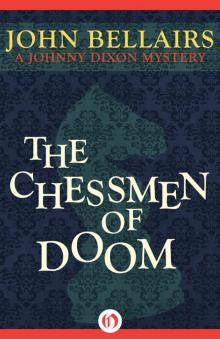 Chessmen of Doom
Chessmen of Doom Secret of the Underground Room
Secret of the Underground Room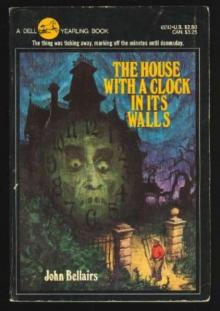 The House With a Clock in Its Walls
The House With a Clock in Its Walls The Vengeance of the Witch-Finder
The Vengeance of the Witch-Finder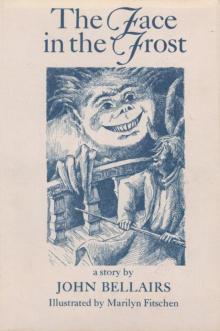 The Face in the Frost
The Face in the Frost Revenge of the Wizard's Ghost
Revenge of the Wizard's Ghost Spell of the Sorcerer's Skull
Spell of the Sorcerer's Skull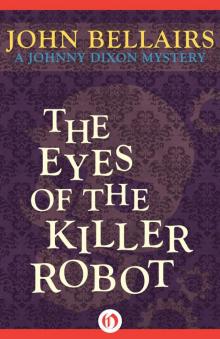 Eyes of the Killer Robot
Eyes of the Killer Robot Mummy, the Will, and the Crypt
Mummy, the Will, and the Crypt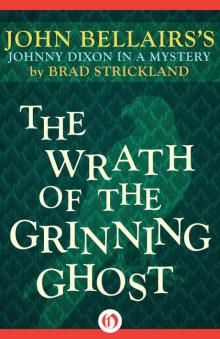 Wrath of the Grinning Ghost
Wrath of the Grinning Ghost The Mansion in the Mist
The Mansion in the Mist The Doom of the Haunted Opera
The Doom of the Haunted Opera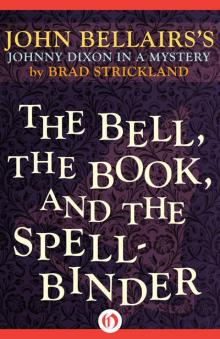 The Bell, the Book, and the Spellbinder
The Bell, the Book, and the Spellbinder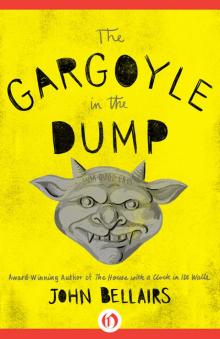 The Gargoyle in the Dump
The Gargoyle in the Dump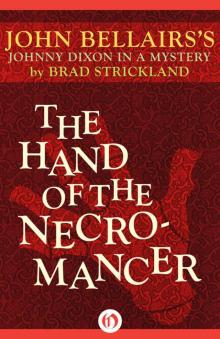 The Hand of the Necromancer
The Hand of the Necromancer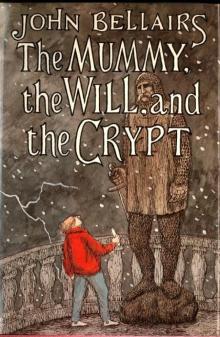 The Mummy, the Will, and the Crypt
The Mummy, the Will, and the Crypt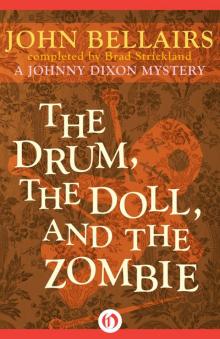 Drum, the Doll, and the Zombie
Drum, the Doll, and the Zombie The Specter from the Magician's Museum
The Specter from the Magician's Museum The Letter, the Witch, and the Ring
The Letter, the Witch, and the Ring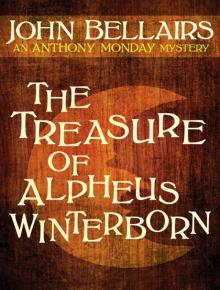 The Treasure of Alpheus Winterborn
The Treasure of Alpheus Winterborn The Dark Secret of Weatherend
The Dark Secret of Weatherend The Figure in the Shadows
The Figure in the Shadows